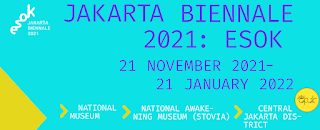Alam Ruang Manusia - Affandi Immersive
Temporary Exhibition
After being stopped since the Covid-19 pandemic, the temporary exhibition of the National Gallery of Indonesia was finally back offline. This time, the National Gallery of Indonesia was presenting an immersive exhibition that highlights the artworks of Indonesian painting maestro, Affandi.
Affandi is one of the world figures of modern painters in Indonesia that adheres to the pure expressionism, but at first Affandi’s career shows his artworks in photographic realist painting which means that his painting is like a picture taken from a camera. He is often referred to as the representation of modern Indonesian art in the international art scene. He works and exhibits around Bandung, Jakarta, Yogyakarta and Bali, as well as across continents by traveling around India, countries in Europe and America. He is actively involved in international prestigious art events such as the Sao Paolo Biennale, Venice Biennale, and World Expo '70 Osaka. His unique painting technique, namely plototan or pouring oil paint directly from the tube onto the canvas and then painting using his fingers, caught the attention of Western critics. His paintings are referred to as "new expressionism".
Affandi's paintings presented in Affandi's Immersive Exhibition entitled "Nature, Space, Human". This exhibition displays a selection of Affandi's artworks (98 paintings) in a video mapping projection. Also displayed 15 of Affandi's paintings in the National Gallery of Indonesia collections.
Bayu Genia Krishbie, the exhibition curator and curator of the National Gallery of Indonesia, revealed that as a whole, Affandi's works of the Immersive Exhibition are arranged in three major themes. "First, about nature, presenting Affandi's observations on objects in nature such as flora, fauna and landscapes. Second, about space, presenting Affandi's works that record a visual capture of the atmosphere in public spaces, private spaces, and architectural objects. Third, about human, presenting portrait works, human activities, and Affandi's alignments with humanity," he explained.
Affandi's Immersive Exhibition, which is a series of the 2020 National Culture Week, was organized by the Directorate General of Culture through the Indonesian National Gallery, supported by the Affandi Museum, OHD Museum, Indonesian Visual Art Archive, and the Indonesian Heritage Society. Visitors to this exhibition were required to register online before visiting the National Gallery of Indonesia. The exhibition was scheduled for six sessions, from 10.00 to 17.00 WIB. The duration of each session was one hour, with a maximum visitor capacity of twenty people for each session. Visitor flow of this exhibition as following: First and second immersive performance space, first and second painting room, and Timeline space.
First Immersive Performance Space
Video Mapping Projection
Second Immersive Performance Space
The experience in the first and second immersive performance space was very memorable and impressive then with the limited time available, visitors must immediately switch to the painting room. After a long period of not visited the offline exhibition, this temporary exhibition was extremely healing and touched for me personally.
Affandi (1907 – 1990)
Self-Portrait with
Pipe (1971)
Self-Portrait
(1974)
100 x 130 cm
Oil on canvas
Both paintings show Affandi’s face in his 60s in different
poses and color nuances. Besides his full-face paintings, Affandi often painted
himself in various scenes such as while holding his pipe, being surrounded by
some masks, or posing with other figures like his friends or collectors.
Affandi (1907 – 1990)
The Black and White
(1974)
99 x 129 cm
Oil on canvas
Affandi focused much of his attention on cock fights, a
tradition found in several regions in Bali. This painting shows a fighting
scene between a black and white roosters in a dynamic movement. Beyond the
painting, Affandi symbolically reveals the struggles of humanity for survival. It’s
like an inevitable battle to determine the status of the winner. Through this
theme – though it was against his personality as a humanist and an “animal
lover” – Affandi wanted to nudge people’s conscience regarding violence.
Affandi (1907 – 1990)
Sunflower 1 (1974)
100 x 170 cm
Sunflower 2 (1975)
101 x 171 cm
Oil on canvas
The paintings of his sunflower-series depict Affandi’s
admiration of Vincent Van Gogh, a famous painter from the Netherlands who
created a similar series before.
Second Painting Room
Affandi’s Life and Work at a Glance
“Some Western critics have called my paintings as a new way of expressionism. But for me, my style is humanism. This means that I paint based on humanity. Because of that, I cannot have ‘art for art’s sake’ as a motto. For me, the term artist is too high. Call me a draftsman or better yet, just a human.” – Affandi.
For
further information:
National
Gallery of Indonesia
Jl. Medan Merdeka
Timur No. 14, Jakarta 10110, Indonesia
+6221-381-3021
Social
Media:
Website: www.galeri-nasional.or.id
Email: galeri.nasional@kemdikbud.go.id
Twitter:
@galerinasional_
Facebook: Galeri
Nasional Indonesia
Instagram:
galerinasional
YouTube Channel:
Galeri Nasional Indonesia
Affandi
Museum
Jl. Laksda
Adisucipto 167 Yogyakarta 55281, Indonesia
+62-274-562593
Social
Media:
Website: www.affandi.org
Email: affandimuseum@yahoo.com / museumaffandi@gmail.com
Twitter: @affandimuseum
Reference:
Personal photos and documentation
Personal impression and experience





















Comments
Post a Comment